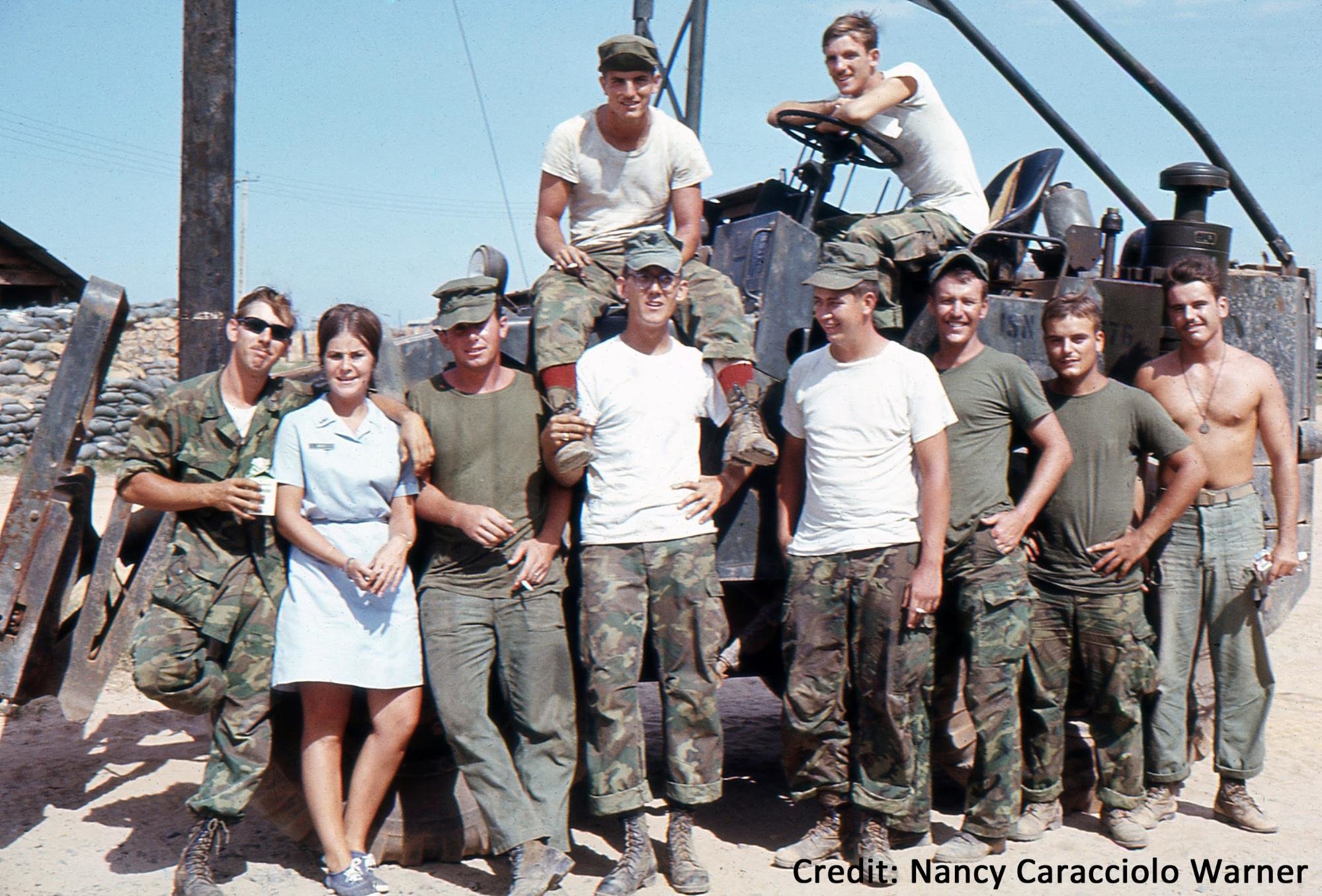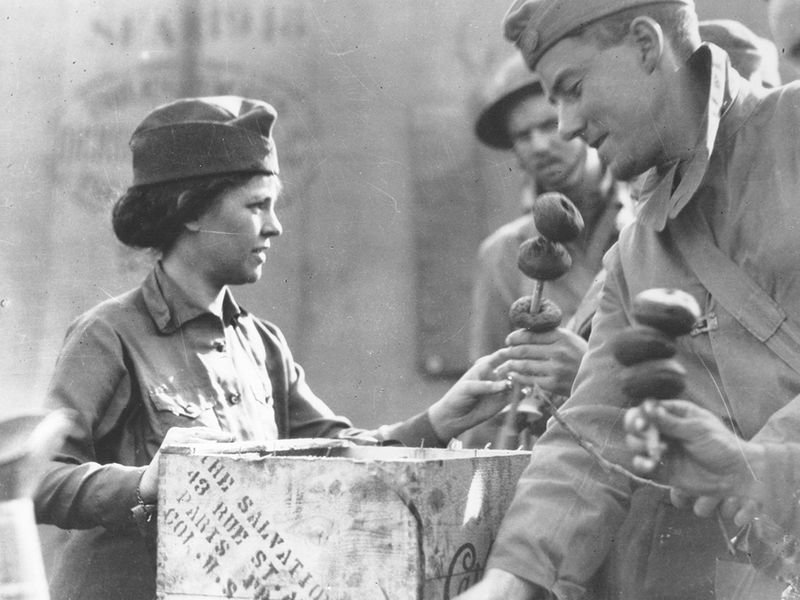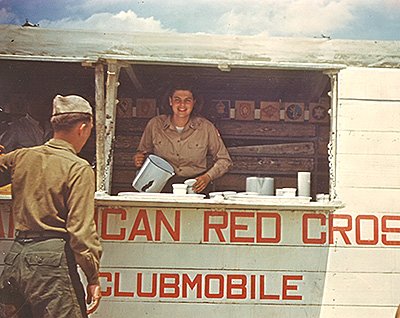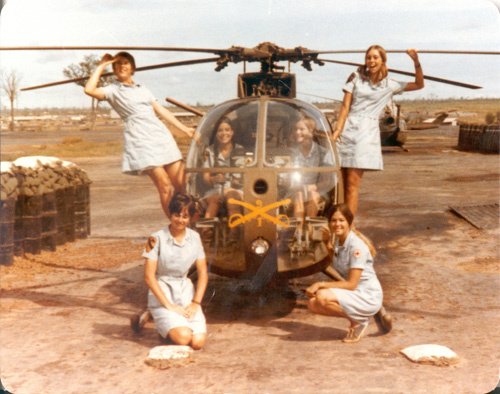The Donut Dollies Brought Coffee & Donuts to the Front Lines from World War II to Vietnam

Inspired by the Salvation Army’s Donut Lassies who contributed morale services during World War I, National Donut Day was established in 1938. The American Red Cross (ARC) has kept the tradition alive by bringing delicious donuts to American troops spanning three additional wars and four decades. From World War II to Korea and the Vietnam War, Donut Dollies (as they were affectionately called) were comprised of all-volunteer women, with exception of some men during World War II, who brought a “touch of home” overseas.
Donut Dollies During World War II
Under instruction of Harvey D. Gibson, an accomplished New York banker and ARC commissioner to Great Britain, free services were to be provided to airfields and base camps. In order to carry out this demand, they assembled single-decker English Green Line buses and transformed them into what later became known as clubmobiles. Each was equipped with the necessities that mirrored that of a heavy-duty makeshift ice-cream truck.
Inside were coffee machines, donut fryers, chewing gum, cigarettes, newspapers, paperback books, and a phonograph with loudspeakers that would often play the tunes of the time. When the back door opened, two benches on either side provided soldiers a place to rest and enjoy their floury delicacy.

Similar to how American troops sought out the Coca-Cola Colonels for the crisp refreshing taste of Coke, the Donut Dollies also made a lasting impression on the troops. They were able to forget the daily stress of being away from their families, if only for a few moments. The ladies were so beloved that 205 ARC women delivered 4,659,728 donuts, according to one December 1944 report.
They also participated in the rear of the invasion of Normandy using American-driven clubmobiles. Stationed in nearby towns and hotels, the Donut Dollier provided refreshments to Allied troops across France, Germany, Belgium, and Luxembourg until 1946 in the post-war period. Aside from the routine, the Blood Donor Service enacted in 1941 allowed the women to aid in medical efforts by conducting blood plasma transfusions for those in need. Some even acted as the lifeline between American prisoners of war and their families back home, delivering care packages and returning messages — despite the Germans’ best efforts to combat them.
By the wars end, 86 ARC workers and volunteers — 34 men and 52 women — lost their lives.
Helen Stevenson Meyner in Korea

In Korea, the Donut Dollie operation continued with a similar mission statement and different faces to share the experience with. At 22 years old, Helen Stevenson Meyner was ecstatic to travel independently for a journey of a lifetime. She wrote several letters of her experience in Japan and Korea, providing insight into the personal lives of the women who were thousands of miles away from their homes. In one letter addressed to her family on Nov. 15, 1950, she wrote:
“I do a little bit of everything in the hospital. I talk to patients (incidentally the majority of the patients are not in bed but hang around the lounge here at the hospital)…drink gallons of coffee, wrap packages, take the patients over to entertainment at the Special Services club. I arrange card games & ping-pong tournaments. I’m even in charge of the birthday party for all the patients this Friday. I’m arranging a talent show and musical games for it. The boys are so cute, so young and most of them scared silly that they will be sent back to Korea (and I’m afraid they will be).”
In a return letter sent by her mother, Eleanor “Bumpy” Stevenson, a veteran of the Red Cross during World War II, she wrote: “There is no other work as fascinating and as rewarding and as deeply wonderful. For the rest of your life you will have real values. You know now what is important. Nothing matters except human relationships and kindness and service. I am so happy that you have had this experience. You can never forget it and never be trite, petty, little, or mean. If only everyone in the world could have a similar experience we would have peace tomorrow and forever.”
Vietnam
During the Vietnam War, the Donut Dollies flew in hueys and aboard planes, played games like blackjack and Jeopardy, sang songs and strummed guitars, all in order to create the initiative enacted by the Supplemental Recreation Activities Overseas (SRAO). The Donut Dollies rarely served donuts, yet they were beloved and respected. They could have easily been enjoying their post-college early 20s in the U.S. as so many of their peers did, but instead they volunteered to entertain the troops with purpose and duty.
Young smiling faces dressed in light-blue uniforms — 627 in total — they were more valuable than they would ever realize. “Although we could make them smile, touch their hands, give them a whiff of perfume, we couldn’t keep them alive,” said one Donut Dollie.
Traveling in pairs, soldiers could come to the Dollies to talk about the emotional and psychological toll of combat because they knew they would understand. The Donut Dollies visited the injured and wounded in hospitals to support their recoveries. The days were all but routine — Judy Harper recalls being dropped off by helicopter in the middle of nowhere to do “their thing.” This entailed bringing plenty of ice cream to the soldiers that rose from the tall grass and exchanging pleasantries before a second helo returned to scoop them up before the enemy could attack.

Holly Watts shared in an interview with PBS the power of being present with the men. “Someone said to me one time, ‘We wanted you there, and it hurt so much when you were’ — we reminded them of their humanity,” she said. Since leaving Vietnam, she had kept the photographs of the men she met next to a poem that read, “Who knew how important it would be for me to remember them, as if I could somehow keep each one alive by the simple act of knowing they existed.”
Another Donut Dollie named Nancy Caracciolo Warner initially applied and interviewed for the State Department and CIA. They offered her a role as a secretary, which she politely declined as it wasn’t quite her speed. After discussing with a teacher who served as a Korea Donut Dollie, she applied, was accepted, and had an adventure in Lai Khe, Phuc Vinh, and An Khe in the Central Highlands from July 1969 to August 1970.
Her most prized memory occurred on a holiday: “I remember the Dust Off crew who, on their own time, took two of us out to many of the firebases and outposts outside of An Khe on Christmas Day,” she recalled. “We dressed as Santas and they flew us, with red and green smoke trailing, to see the guys. It was the best Christmas ever!”
Three of the Donut Dollies never made it home from Vietnam: Hannah E. Crews died in a jeep accident in Bien Hoa on Oct. 2, 1969; Virginia E. Kirsch was murdered by a U.S. soldier on drugs in Cu Chi on Aug. 16, 1969; and Lucinda J. Richter died of Guillain-Barre syndrome in Cam Ranh Bay on Feb. 9, 1969. Their sacrifice and service to the men and women in Vietnam will not fade as long as we continue to share their names. While there are no longer Donut Dollies to serve and entertain the troops, their service surely gave homesick servicemen a little peace of mind in the midst of the chaos of war.

Matt Fratus is a history staff writer for Coffee or Die. He prides himself on uncovering the most fascinating tales of history by sharing them through any means of engaging storytelling. He writes for his micro-blog @LateNightHistory on Instagram, where he shares the story behind the image. He is also the host of the Late Night History podcast. When not writing about history, Matt enjoys volunteering for One More Wave and rooting for Boston sports teams.
BRCC and Bad Moon Print Press team up for an exclusive, limited-edition T-shirt design!
BRCC partners with Team Room Design for an exclusive T-shirt release!
Thirty Seconds Out has partnered with BRCC for an exclusive shirt design invoking the God of Winter.
Lucas O'Hara of Grizzly Forge has teamed up with BRCC for a badass, exclusive Shirt Club T-shirt design featuring his most popular knife and tiomahawk.
Coffee or Die sits down with one of the graphic designers behind Black Rifle Coffee's signature look and vibe.
Biden will award the Medal of Honor to a Vietnam War Army helicopter pilot who risked his life to save a reconnaissance team from almost certain death.
Ever wonder how much Jack Mandaville would f*ck sh*t up if he went back in time? The American Revolution didn't even see him coming.
A nearly 200-year-old West Point time capsule that at first appeared to yield little more than dust contains hidden treasure, the US Military Academy said.












